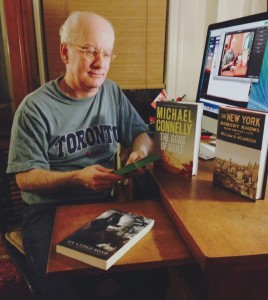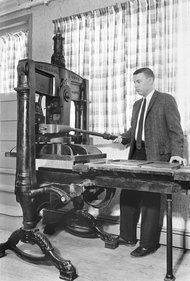 As a member of PEN America, I was invited to participate in a PEN speak-out Tuesday night that was part of Talking Transition, an event going on all week and next in Soho, providing input on policy and priorities to NYC’s incoming mayor Bill de Blasio, all citywide officeholders, and the new members of our City Council. Talking Transition is taking place in a big heated tent that’s set up on the north side of Canal Street, along Sixth Avenue. Each day this week has been devoted to a different topic–Tuesday night had an emphasis on Arts & Culture. PEN chose to devote its 90-minute slot to “Keeping NYC a literary and cultural capital.” On Twitter, you can follow transition events @TalkNYC2013 and the hashtag #TalkingTransition.
As a member of PEN America, I was invited to participate in a PEN speak-out Tuesday night that was part of Talking Transition, an event going on all week and next in Soho, providing input on policy and priorities to NYC’s incoming mayor Bill de Blasio, all citywide officeholders, and the new members of our City Council. Talking Transition is taking place in a big heated tent that’s set up on the north side of Canal Street, along Sixth Avenue. Each day this week has been devoted to a different topic–Tuesday night had an emphasis on Arts & Culture. PEN chose to devote its 90-minute slot to “Keeping NYC a literary and cultural capital.” On Twitter, you can follow transition events @TalkNYC2013 and the hashtag #TalkingTransition.
Each member who chose to speak was given just a 3-minute slot, so we really had to trim our points down to the minimum. The group was comprised of almost two dozen speakers, including several poets, administrators of poetry and literary programs, and publishing colleagues. The evening moved along with alacrity in front of a pretty good-sized audience under the big tent. This was the preliminary list of speakers, which came off with only a few small changes. I titled my own talk “Support the Book Economy, Foster Publishing Experiments.” The transcript of my remarks, delivered almost verbatim, is here, and below them is a key point I would’ve made if I’d had a bit more time.
I titled my own talk “Support the Book Economy, Foster Publishing Experiments.” The transcript of my remarks, delivered almost verbatim, is here, and below them is a key point I would’ve made if I’d had a bit more time.
Support the Book Economy, Foster Publishing Experiments.
When the recession hit in September 2008, the book economy in New York, was already in a parlous state. To choose just two measures, the rate of closure among indie bookstores was rising and the income of mid-list authors was declining, along with their access to being published at all. A few months later, in January 2009, I was swept out of corporate publishing when the imprint where I’d been editorial director was shuttered. Much as I could talk about my experiences over the past five years, the new business I started, or my three decades in the book business, this talk is not about me, for I am only one among 100s of publishing professionals who lost full time jobs in the months and years since the economic collapse who have yet to again find full employment. To get at the scale of the problem, consider that in 2009 Publishers Weekly started a “Comings & Goings” feature that allowed folks to submit their contact info so that others who wanted to be in touch, to hire them, or just to network, could do so. It had over 200 names at one point. And then last month another book news outlet, Media Bistro’s galleycat, created a directory of just freelance editors, which after a few weeks already has nearly 300 people in it. Based on my observations of book industry layoffs, I’m sure that these figures of self-selecting people only hint at the total numbers.
Clearly, there is still a wealth of great publishing talent in the city. That’s good news. And yet while many of us are still working as editors, marketers, and publicists, or working in adjacent fields like online news, often we are not being paid adequately, and sometimes not at all, for time spent on publishing tasks we hope will one day turn in to full time jobs or paying assignments. Regrettably, this condition persists even while the book industry has experienced a boom from digital reading that’s given greater exposure to book culture, increased the engagement of many readers, and left thousand of readers more avid for books, print and digital.
Yet, even while the boom has grown, the benefits of it are not being felt by most of the under-employed full time publishing workers. This crisis offers the city an opportunity to capitalize on the talents of all these bookpeople with publishing incubators that would foster innovation, experiments, and new models to help business-savvy bookpeople turn their enterprises and current projects in to job-creating engines of the book and the New York City economy.
Therefore, I urge City Council, Mayor-elect de Blasio, and all citywide officeholders to establish public-private partnerships and other initiatives that would help make available low-cost or no-cost business enterprise advice (legal, accounting, financing); no-cost or low-cost workspaces where people could share cubicles, WiFi, and conference rooms. With philanthropic support, or venture capitalists with money looking to do good, a fund for experiments could be launched, with grants being provided to offer recognition, encouragement, and a stipend. I urge the tech community, really a first cousin to digital publishing, to work with bookpeople to create new initiatives that will elevate the entrepreneurial efforts of New York City’s publishing community.
My addendum to these comments is an explicitly political point. One of the reasons that the economy remains anemic in New York City and around the country–with a lack of full employment for millions of people, not just publishing professionals–is that obstructionists in Congress have imposed austerity on the country. Since 2010, right-wing politicians have thwarted any ongoing economic stimulus that would, if enacted, help prime the pump and accelerate demand. This has been denied us, even at a time of very low interest rates. Now, with the victories of Mayor-elect de Blasio, many progressive citywide officeholders, including by far the most progressive City Council since I moved to New York in 1985, I hope that the city, and my own precious book industry, can have, courtesy of the new actors in city government, its own local and direct stimulus that will benefit publishing, readers, authors, and all of New York City.
Finally, here are pictures I took Monday and Tuesday night when I attending Talking Transition events. PEN Participants had been asked to submit favorite quotations, our own, or those of other writers, which you’ll see in a tweet cloud in many of the photos.Please click here to view them.
 Delighted to have so much free time this week for this terrific collection of great recreational and work-related reading. Here’s a quick rundown on each book with the tweets I put out about them tonight.
Delighted to have so much free time this week for this terrific collection of great recreational and work-related reading. Here’s a quick rundown on each book with the tweets I put out about them tonight.










